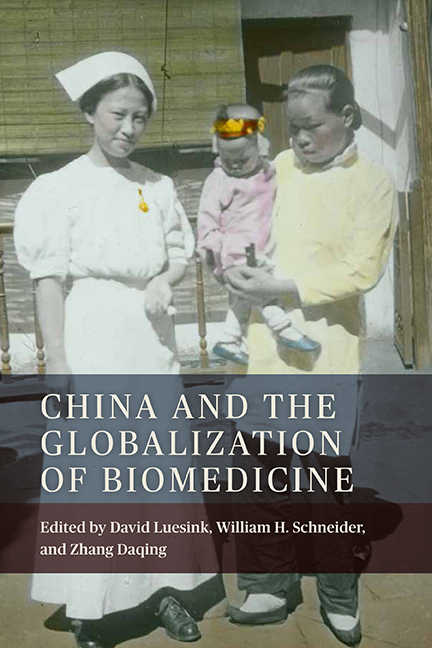Book contents
- Frontmatter
- Dedication
- Contents
- List of Illustrations
- Preface
- Acknowledgments
- List of Abbreviations
- Introduction: China and the Globalization of Biomedicine
- Part One Hygiene and Disease Construction in Late Qing China
- Part Two The Indigenization of Biomedicine in Republican China
- Part Three The Spread of Biomedicine to Southwest China, 1937–1945
- Afterword: Western Medicine and Global Health
- List of Chinese and Japanese Terms and Names
- Selected Bibliography
- List of Contributors
- Index
4 - An Abortive Amalgamation: Multiple Western-Style Doctors in Republican China, 1927–1937
Published online by Cambridge University Press: 27 March 2021
- Frontmatter
- Dedication
- Contents
- List of Illustrations
- Preface
- Acknowledgments
- List of Abbreviations
- Introduction: China and the Globalization of Biomedicine
- Part One Hygiene and Disease Construction in Late Qing China
- Part Two The Indigenization of Biomedicine in Republican China
- Part Three The Spread of Biomedicine to Southwest China, 1937–1945
- Afterword: Western Medicine and Global Health
- List of Chinese and Japanese Terms and Names
- Selected Bibliography
- List of Contributors
- Index
Summary
In 1934, two of China's largest nationwide medical organizations, the Chinese Medical Association (CMA) and the China Medical and Pharmaceutical Association (CMPA), tried to amalgamate, but then failed, due to a series of impolitic articles in the Chinese section of the Chinese Medical Journal in 1933. This chapter will examine this incident, revealing the underlying reasons in order to emphasize that the development of modern medicine in Republican China was seriously impeded by the contradictions between multiple groups of Western-style doctors. The appearance of these distinct groups of physicians can be attributed not only to the impact of different colonial powers on China, but also to the different experiences of development and group interests that led these different groups to diverge from each other. When the contradiction between modern Western-style medicine and Chinese native medicine intensified after 1929, the relationship between these groups of Western-style doctors worsened, and as a result, Western-style doctors failed to merge or even find agreement on many issues to improve the state of Western-style medicine in China.
In the past few decades significant research has been done on medicine in Republican China, particularly the massive transformation of Chinese medicine. As a variation of the impact-response model, many studies emphasized Chinese native doctors’ resistance or adjustment to the transformation. Comparatively less attention has been paid to Western-style doctors, especially as groups or associations, due perhaps to the influence of China-centered history since the 1980s. Some scholars have pointed out the different opinions among Western-style physicians on the issues of abolishing Chinese native medicine and building a modern style of medicine. Memoirs of various physicians have also mentioned that there were different factions among Western-style doctors; they had conflicts in either the bureaucracy or various medical institutions. However, some basic questions have not yet been answered: When and how were these groups formed? What were the differences among them? How did these differences affect their nature? Understanding the nature of Western-style doctors is essential for us to understand medicine in Republican China; they were, after all, primary advocates and promoters in the development of modern medicine in China. In this chapter, I will explore the divergence between two leading Western-style doctors’ associations by focusing on the failed merger incident in 1934, and then discuss the reason behind this divergence and the influence it had on the medical field.
- Type
- Chapter
- Information
- China and the Globalization of Biomedicine , pp. 109 - 130Publisher: Boydell & BrewerPrint publication year: 2019



